Pakistan
Trailblazers and Fighters
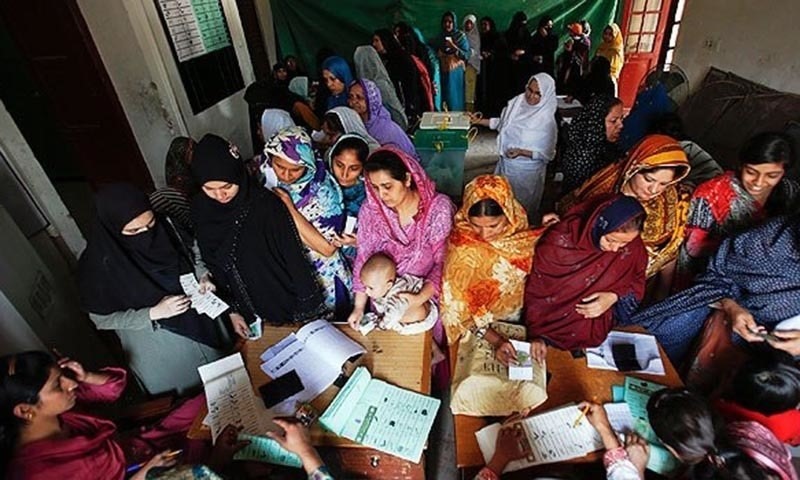
Local people term it a revolution in a conservative society
© RuetersFrom the inception of Pakistan, women have played a crucial role in the country's creation. Their significance in the nation’s history is undeniable. During the independence movement, Muslim women were at the forefront, participating in demonstrations and agitations alongside men. Notable figures like Fatima Jinnah, Ra’ana Liaquat Ali Khan, Begum Abdullah Haroon, Begum Ghulam Hidayatullah, Jehan Ara Shahnawaz, Viqarun Nisa Noon, Begum Tassaduq Hussain, and many unnamed others fought valiantly against colonial powers for a separate nation.
Initially, women’s protests,during partition, were concentrated in Lahore and Karachi, but the 1947 Civil Disobedience Movement saw Pakhtun women in modern-day KP joining the cause.
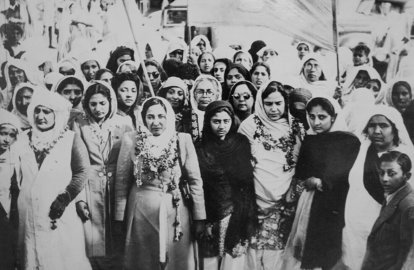
Women leaders of the Muslim League are released from Punjab Jail in March 1947
© Lahore Museum ArchivesThis was due to the encouragement by the founder of Pakistan, Quaid e Azam, who emphasised the necessity of women's equal participation for the emancipation of Muslim men. He even established a central women's committee, led by Fatima Jinnah and ensured a women’s quota in the Muslim League, highlighting the importance of women as equal partners in politics.
However post-independence, women’s inclusion in politics and democratic processes faced significant setbacks due to prolonged periods of dictatorship.
Despite repression, Pakistani women remained resilient and their efforts bore results when Pakistan became the first Muslim country to elect a female prime minister, Benazir Bhutto, not once but twice into power.
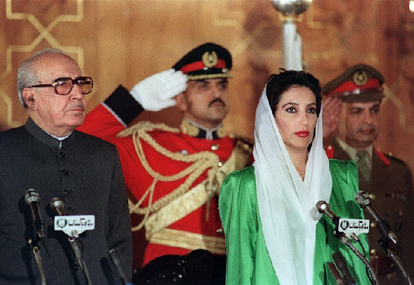
Prime Minister Benazir Bhutto at her first oath-taking ceremony - 1998 (Source Twitter)
Even the 2024 elections saw a notable increase in female political candidates, with 3,139 women stepping forward — far more than the number of women who submitted nominations for the 2018 and 2013 general elections.
Though this number was celebrated and hailed as an achievement, when seen in light with the total no of candidates being 28,000 it shows how disproportionate it is and highlights the gender disparity in the country when it comes to representations in political fronts.
Sadly it does not end here, it continues even when they are elected, for instance, Maryam Nawaz, the first female chief minister of Punjab, often faces criticism focused on her clothing rather than her policies.
Dual Realities of Women Candidates in Khyber Pakhtunkhwa
In northern Pakistan, Dr. Savera Prakash made history in the 2024 elections as the first Hindu woman running for a provincial assembly seat from Buner’s PK-25 constituency. It was expected that her canvassing might prove to be a challenge as the society in KP is generally male-dominated. But surprisingly, her nomination was celebrated not just by the women but more so by the men of the area.
In fact, in an interview, Dr Prakash shared that all the expenses of her banners were taken over by a member of Jamiat-i-Islami. “I belong to the middle class and am from a minority group, but the people of Buner from different dominant tribes call me ‘Buner ki beti’ [daughter of Buner]. I even received support from rival political parties and witnessed great unity from the public, including from religious parties. A member of the Jamaat-i-Islami paid for the expenses of my banners and assured the printing press owner that all my costs would be covered by him,” she said, talking to Dawn.com.
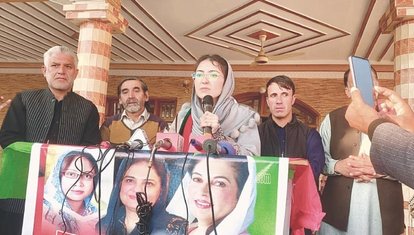
Encouraged by her father to join the political arena, Dr Prakash hopes to bring a sea change in her field, i.e. healthcare- Buner
© Shad MuhammadShe might have lost the elections, but she set a precedent which will help other girls in the area widen their aspirations with the hope that all is possible.
However, all is not well in KP.
Dr Prakash might have been lifted up by the people in her district, but in a different district of the same province, women candidates had to face extraordinary hurdles. In conservative constituencies of the Kohistan and Torghar regions in KP’s Hazara district, four women, namely Tehmina Faheem, Shakeela Rabbani, Sannaya Sabeel, and Momina Basit, entered the electoral battlefield for the first time. Unlike Prakash's experience, women in these constituencies were barred from canvassing. A group of clerics, mostly members of Jamiat Ulema-i-Islam-Fazl, issued a fatwa (Islamic decree) stating that canvassing by and for women parliamentarians is an un-Islamic act.
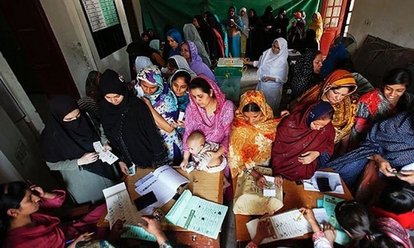
Local people term it a revolution in a conservative society
© RuetersBecause of this, Tehmina Faheem, a social worker turned political candidate, had to limit her campaigns to a few liberal-minded workers in the district of the PTI. Shakeela Rabbani, who was running her campaign in Torghar PK-41, also faced severe restrictions, limiting her campaign to those willing to welcome a female election candidate. Unfortunately, all four women running from this district lost the elections.
The hostility towards women in politics was further evident when Sobia Shahid, a member of the Pakistan Muslim League-Nawaz (PML-N), faced harassment during the KP assembly’s oath-taking ceremony in February 2024.
This incident highlights the ongoing struggle for women in the political sphere.
Unrecognised Contributions
Throughout Pakistan’s history, women have been pivotal in public protests and social movements. From the 2013 women-led protests in Swat for civic amenities to the Hazara women’s protests against targeted killings and the Gwadar women marching for basic rights, Pakistani women have consistently been at the forefront. However, their contributions often go unrecognised.
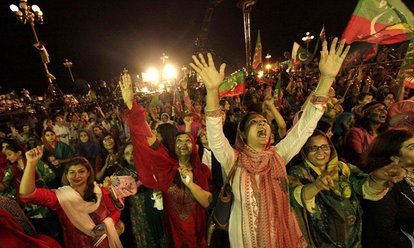
PTI’s Azadi March in 2014
© ReutersAcademic Ayesha Khan, who is also author of the book ‘The Women’s Movement in Pakistan: Activism, Islam, and Democracy’, notes that women in Pakistan have always been politically engaged at various levels, but their lack of visible leadership roles means their contributions to political culture are less acknowledged.
Senior leader Bushra Gohar of the National Democratic Movement (NDM) echoes this sentiment, highlighting the male-dominated, patriarchal, and often hazardous political environment women face.
Bushra Gohar, a senior leader of the National Democratic Movement (NDM) and former senior vice-president of the Awami National Party (ANP), said “Politics in Pakistan is male-dominated and controlled. There is very little space and acceptance of women in politics. Women have to work twice as hard to be accepted as a leader,”
“Patriarchy, tribalism and conservatism coupled with Talibanisation as state policy have made the political environment toxic and hazardous for women in politics,” she said, listing the reasons that deter women from entering and staying in politics.
Political parties, civil society, and government institutions must shoulder the responsibility to foster an environment where women’s political engagement transcends tokenism and becomes a cornerstone of our democratic fabric.
Talking about the diminishing presence of women in politics, Gohar said “over the years, political parties have become family enterprises with very little room for ideological politics.”
As a result, women’s participation in protests and movements has shrunk, she lamented. “This is largely because political parties haven’t invested in women members’ mobilisation and facilitation. Security and financial constraints have also affected women’s participation in public gatherings.”
Despite the grim looking condition Babar is still hopeful, “it is absolutely important that women are part of the mainstream politics to carry forward the agenda of their emancipation. In a patriarchal society like Pakistan, women will have to take the lead,” she said
“They have proved that when they took the lead, they also made significant achievements. Women must therefore be an important part of any protest or political movement for their emancipation.”
Women in Pakistan have demonstrated that when they take the lead, they achieve significant milestones. Their resilience and persistent struggle continue to pave the way for future generations, reinforcing the importance of their role in political movements and protests for their rights and equality.
The current state of women’s participation in national politics underscores the need for urgent action. Political parties, civil society, and government institutions must shoulder the responsibility to foster an environment where women’s political engagement transcends tokenism and becomes a cornerstone of our democratic fabric.
This is not just about meeting quotas or surpassing previous statistics; it is about fundamentally redefining the political landscape to be truly inclusive, equitable, and representative of diverse voices.
